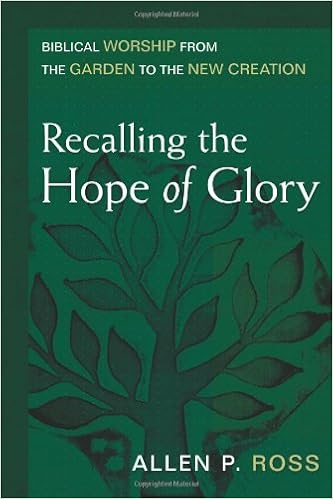
Recalling
the Hope of Glory: Biblical Worship from the Garden to the New Creation
by Allen Ross
What is the foundational element of worship from a
theological perspective? Why do we
worship in the way we do as Christians?
All these questions are encountered in the delightful and carefully
written book, Recalling the Hope of Glory by Professor Allen Ross. Ross is known for his insightful works on the
Psalms (both from Kregel Academic) and his work on Biblical Hebrew. In this book on worship, Allen begins by
cataloging the lowly and unsatisfying picture of worship in many of our
churches as a mundane affair that is casually done by its participants. Instead, Ross rightly posits worship as “a
transcendent meeting with the living God (39).”
The reason that so much of our worship is lacking in substance and
vision is the deficit of a robust biblical and theological of worship that
undergirds all of what we do and say concerning worship (38).
When we come to the fount of meaning concerning
worshiping God, where do we start? Ross
clues us in on the answer by bringing us back to the Scriptures, specifically
Isaiah 6. In Isaiah 6, the holiness of
God is in view, and the proper response to God’s holiness is fear and
adoration, confession and commitment (52-53).
While I thought this first chapter was very illuminating, Ross’ discussion
of ritual acts of worship developing our four senses was especially
helpful. He identifies in ritual actions
in worship four senses which are touched in worship; namely the intellectual, aesthetic,
corporate, and moral sense (57-60).
These senses taken together include the cognitive apprehension of what
is going on in worship (doctrine and ritual), the beauty of the art of worship,
the nature of the worshipping community, and the moral formation that is caused
by engaging in worship. This is a
helpful delineation of worship and our senses because without one of these
components, worship does not affect lasting change in our lives.
In the midst of Allen’s discussion regarding the
Perversion of Paradise, he looks at some compelling passages that shed light on
both God’s grace and God’s remedy for sin.
He writes, “When Adam and Eve admitted their sin, God replaced their
temporary coverings with animal skins. Clothing
thus became a symbol of God’s grace…” (115).
Ross connects this idea of clothing with what we find in later
Scriptural texts, namely that righteousness and holiness are connected to the
garments of holiness, whether white linens or other glorious apparel. The point isn’t so much the apparel itself
but the holiness that comes from being in relationship with God and us
revealing the holiness of our Savior. As
God’s grace was evident in God giving our first parents garments of animal
skins, so it is God’s grace which grants us the white linens of holiness as we
approach God as witnessed in the Book of Revelation.
This is a beautifully written and well-researched
book. I hope you will enjoy it as I
surely did.
Thanks to Kregel Academic for the copy of this book
in exchange for an honest review.
Comments
Post a Comment